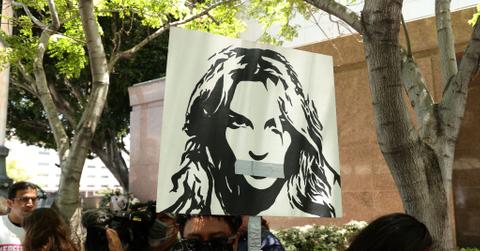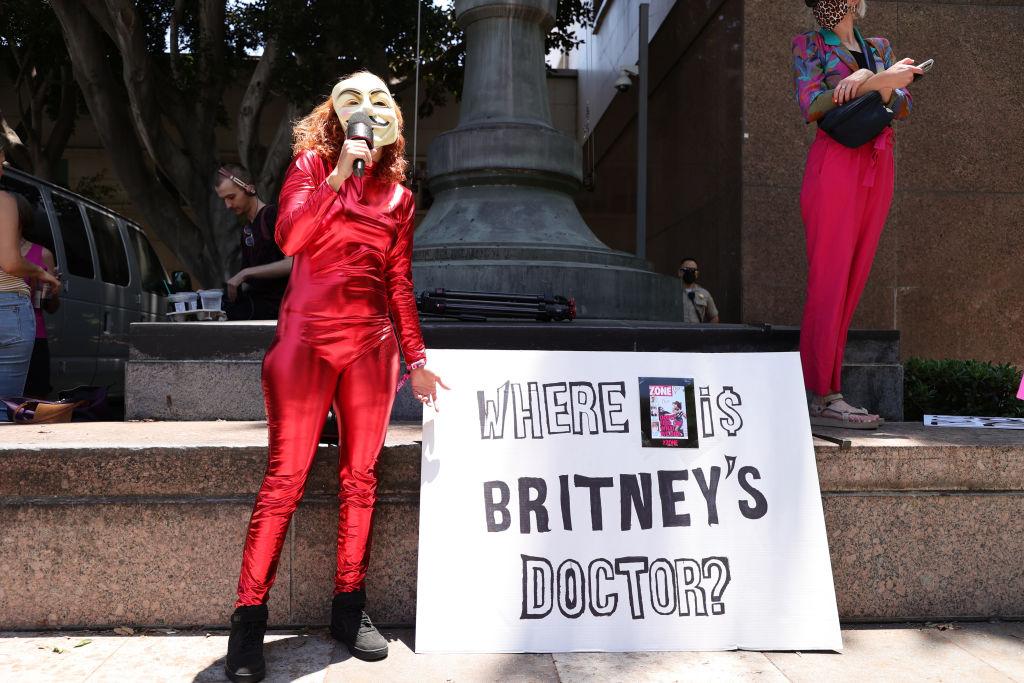Why Was Britney Spears Put on Lithium? What the Drug Really Does
Published June 23 2021, 9:18 p.m. ET

In 2008, Britney Spears' conservatorship began. And in 2021, it's still going. The 39-year-old has fought her conservatorship in court to no avail, but the #FreeBritney movement lives on, with the goal not only being to end Britney's conservatorship but to change the very laws that allowed it to be put in place.
On June 23, 2021, Britney addressed the court for the first time in two years, opening up about some of the more painful details of having her father, Jamie Spears, among others, control her life for the past 13 years. The pop star talked about some of the "abusive" situations she has faced under the conservatorship, including being unable to take out her own IUD in order to have more kids and being forced on the drug lithium against her will.

Why was Britney Spears put on lithium?
Some may remember that, in 2007, Britney had what was widely described as a breakdown. Although many may recall the moment in which she very famously shaved her head or when she damaged a paparazzo's car that was tailing her, other instances of her supposed breakdown included adopting a fake British accent and reports that she was not sleeping. Fueled by these instances, rumors spread, with the sources being named as "family and friends," that she had bipolar disorder.
However, at the time, it remained just a rumor that Britney herself did not speak out on. In 2013, she finally addressed it, saying in her documentary I Am Britney Jean, "I have always been kind of shy, since I was a little girl. It’s who I am to be modest, so I really can’t help it. It’s almost like it’s my alter ego when I get on stage … I turn into this different person, seriously. Bipolar disorder."

It's worth noting, though, that Britney has never confirmed her bipolar diagnosis beyond this statement. Moreover, it was reported in 2019 that Britney checked herself into a mental health facility, citing emotional distress over her father's recent health problems. According to court documents obtained by the New York Times, that was false. In 2019, she told the court that she was forced into the facility against her will.
But now Britney has come forward to say more about what was forced upon her throughout this conservatorship. Addressing the court on June 23, she said that she was forced to take lithium against her will. She, again, did not cite any medical condition that may require lithium, like bipolar disorder. She said that it all began when she tried to say no to doing her Las Vegas residency.
"I remember telling my assistant, I feel weird if I say no, I feel like they’re gonna come back and be mean to me or punish me or something. Three days later, after I said no to Vegas, my therapist sat me down in a room and said he had a million phone calls about how I was not cooperating in rehearsals, and I haven’t been taking my medication," she stated, according to the court transcript.
"All this was false — he immediately, the next day, put me on lithium out of nowhere. He took me off my normal meds I’ve been on for five years. And lithium is a very, very strong and completely different medication compared to what I was used to. You can go mentally impaired if you take too much, if you stay on it longer than five months," she said.
She continued describing what she experienced while on the med, saying, "I felt drunk. I couldn’t even have a conversation with my mom or dad really about anything. I told him I was scared, and my doctor had me on six different nurses with this new medication, come to my home, stay with me to monitor me on this new medication, which I never wanted to be on to begin with. There were six different nurses in my home, and they wouldn’t let me get in my car to go anywhere for a month."

What is lithium used for?
Lithium is typically used to treat bipolar disorder, though it is sometimes prescribed "off-label" to treat depression, according to NAMI. Side effects of the drug include headache, nausea, diarrhea, dizziness, drowsiness, changes in appetite, hand tremors, dry mouth, increased thirst, increased urination, hair loss, and an acne-like rash.
In rare cases, someone may experience lithium toxicity or diabetes insipidus. After long-term use of the drug, you may be more at risk for hypothyroidism or kidney problems, which is why it's crucial for those on the medication to monitor lithium levels in their blood.
It should be noted that, had Britney not been under the conservatorship, she would not have been able to have been forced to take a medication she did not feel comfortable taking. According to the California Department of Health Care Services, voluntary patients have the right to refuse any medical or mental health treatments, including medications, "unless the situation is an emergency."
The same cannot be said for conservatees. If you are a conservatee, like Britney, or the judge has granted your conservator power to make decisions in your mental health treatment, you no longer have the right to refuse treatment unless otherwise stipulated by a judge.
If you or someone you know needs help, use SAMHSA Behavioral Health Treatment Services Locator to find support for mental health and substance use disorders in your area or call 1-800-662-4357 for 24-hour assistance.